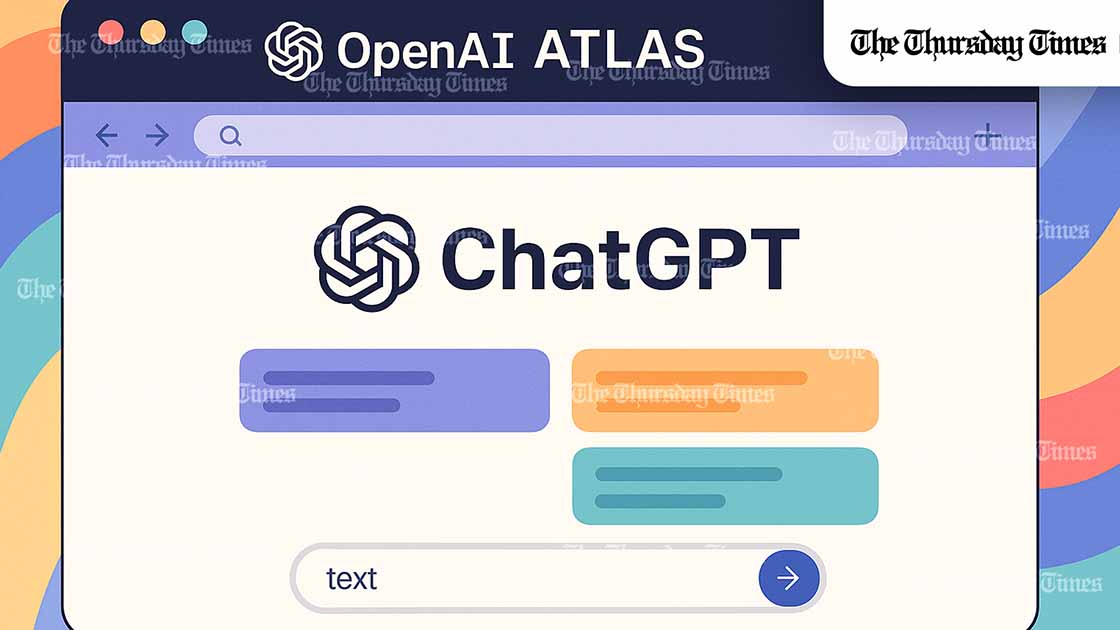LONDON (THE THURSDAY TIMES) — OpenAI has unveiled ChatGPT Atlas, a new artificial intelligence browser designed to transform how users engage with the web. Initially released for macOS, the launch marks OpenAI’s boldest challenge yet to Google and Microsoft, as it brings conversational AI directly into the browsing experience.
A conversation with the web
Atlas is built around the idea that browsing should feel more like dialogue than search. Users can ask ChatGPT to explain a news story, translate a paragraph, or find alternative products without leaving the page. The AI processes the context of what is on screen, turning web navigation into an interactive conversation.
Instead of endless tab-hopping and copying text, users can now interrogate information in real time, a step that blurs the line between reading and reasoning.
From search to action
A key innovation within Atlas is Agent Mode, a feature that allows the AI to act autonomously across pages. It can complete forms, make reservations, or even perform comparisons while the user multitasks elsewhere. This is currently limited to premium users but signals a future in which browsers become intelligent assistants rather than static tools.
A direct challenge to Google and Microsoft
OpenAI’s entry into the browser market poses a direct challenge to Chrome and Edge, which together dominate more than 80 percent of global web traffic. Atlas removes the traditional barrier between search and understanding by embedding ChatGPT at the core of navigation.
While Google continues to develop its AI-powered “Search Generative Experience” and Microsoft expands its Copilot integration within Edge, OpenAI has taken the bolder route, building the intelligence into the browser itself.
Privacy and Control
OpenAI emphasises that users remain in control of their data. Browsing history can be cleared or excluded from AI memory, and a private mode disables all contextual retention. This approach aims to balance the convenience of AI with the need for transparency and trust in an increasingly data-conscious digital environment.
The wider impact
For everyday users, Atlas makes browsing simpler, faster, and more conversational. Yet for publishers and advertisers, it presents a looming challenge. If users rely on AI summaries rather than visiting original websites, traffic patterns could shift dramatically, altering how the online economy functions.
Atlas, therefore, is not only a product launch but a philosophical statement about the future of human–web interaction.
How Atlas Compares vs Google and Edge
| Feature | ChatGPT Atlas | Google Chrome | Microsoft Edge |
|---|---|---|---|
| Developer | OpenAI | Microsoft | |
| Core Focus | Conversational browsing with integrated AI | Speed, extensions, and integration with Google services | Productivity tools, AI (Copilot), and Windows integration |
| AI Integration | Built-in ChatGPT for summarising, analysing, and automating tasks | AI features mostly via Gemini Search and plugins | Bing Copilot integrated, but separate from core browsing |
| Task Automation | Yes (Agent Mode performs actions across tabs) | Limited (requires extensions or scripts) | Limited automation through Copilot prompts |
| Context Awareness | Understands content within open tabs for dynamic responses | Context-limited to single-page or plugin interactions | Partial through Copilot, not continuous |
| Privacy Controls | User-managed memory, private browsing mode, no data retention by default | Google account sync, data used for personalisation and ads | Data sync with Microsoft account, telemetry partially optional |
| Platform Availability | macOS (Windows, iOS, Android coming soon) | macOS, Windows, Linux, iOS, Android | Windows, macOS, iOS, Android |
| Extensions | Supports Chrome-based extensions | Full Chrome Web Store integration | Compatible with Chrome extensions |
| Business Model | Subscription-based (Plus/Pro tiers) | Free, ad-driven ecosystem | Free, Microsoft ecosystem integration |
| Ideal For | Users seeking AI-driven productivity and research | General users needing speed and compatibility | Microsoft ecosystem users and hybrid professionals |
Atlas is now available for macOS users, with wider releases planned for 2026. Industry analysts view it as one of the first serious attempts to reinvent the browser since Chrome’s debut over fifteen years ago.
Want to learn how to install and use Atlas? Read our companion guide: How to Get and Use OpenAI’s ChatGPT Atlas Browser.
Whether users embrace Atlas as a daily companion or treat it as a novelty remains to be seen. But one thing is clear: OpenAI is no longer content to answer questions, it wants to own the window through which people ask them.





